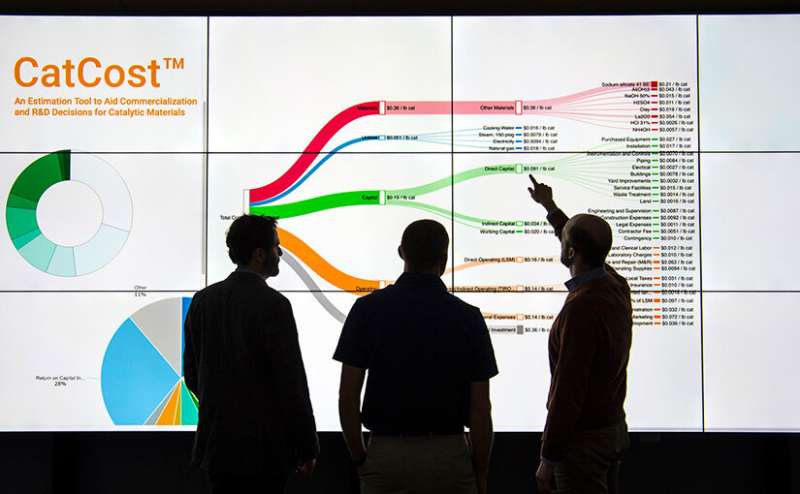Online tool offers insight into catalyst manufacturing cost and environmental impact

The road to the commercial adoption of new catalytic materials can be long, expensive, and fraught with risk. Often, the early identification of catalyst costs is overlooked because there are few resources in the public domain available to researchers.
Scientists from the National Renewable Energy Laboratory’s (NREL’s) Catalytic Carbon Transformation and Scale-Up Center have sought to reduce these barriers to early-stage catalyst cost estimation by developing CatCost, a free and publicly available cost estimation tool that aims to equip researchers with the information they need to make informed R&D decisions.
In their recent paper published in Nature Catalysis, “Early-Stage Evaluation of Catalyst Manufacturing Cost and Environmental Impact Using CatCost,” the scientists at NREL demonstrate the functionality of CatCost with a case study evaluating the manufacturing costs and environmental impact of three high-performance catalysts for the conversion of biomass to fuels and chemicals.
The paper quantified environmental and economic benefits that could be made by replacing existing zeolite-based catalysts with more stable catalysts based on platinum and molybdenum carbide. Frederick Baddour, principal investigator for the CatCost project, said, “The case study stands out to me as an exciting example of how our economic expectations can be subverted by a simple analysis.” He went on to say, “I expected the platinum-containing catalysts to be more expensive in all scenarios, but their enhanced stability made it competitive” for use in catalytic fast pyrolysis, in which biomass vapors are converted to fuels and chemicals.
The authors also looked into opportunities to reduce cost further, finding that the cost of the commercially mature zeolite catalyst, which involves a complex industrial process, was driven by processing costs and highly dependent on production scale. The next-generation Pt and Mo2C catalysts, on the other hand, were dominated by raw materials costs at all scales, revealing opportunity for savings through improved synthesis methods. NREL scientist Kurt Van Allsburg, first author of the paper, noted, “These are the types of findings that help direct research into the areas that will have the most impact. If we can identify the source of costs early, we can make the necessary design changes.”
Kurt M. Van Allsburg et al, Early-stage evaluation of catalyst manufacturing cost and environmental impact using CatCost, Nature Catalysis (2022). DOI: 10.1038/s41929-022-00759-6
Citation:
Online tool offers insight into catalyst manufacturing cost and environmental impact (2022, April 1)
retrieved 1 April 2022
from https://techxplore.com/news/2022-04-online-tool-insight-catalyst-environmental.html
This document is subject to copyright. Apart from any fair dealing for the purpose of private study or research, no
part may be reproduced without the written permission. The content is provided for information purposes only.
For all the latest Technology News Click Here
For the latest news and updates, follow us on Google News.

